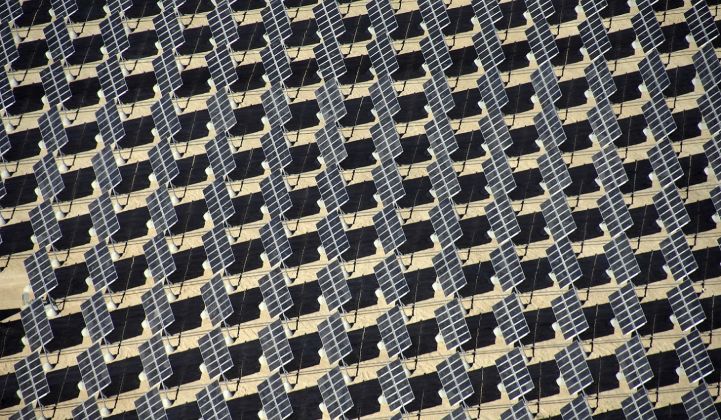Last week, the solar industry met Maxeon Solar Technologies, a spinoff that will pull SunPower’s global solar panel manufacturing and sales into a new company based in Singapore.
Expected to close next year, the split will leave a pure-play U.S. distributed solar and services company in SunPower, alongside the industry’s newest solar panel manufacturer, Maxeon.
In an interview, Maxeon CEO Jeff Waters, formerly head of SunPower’s Technologies arm, said he plans to double Maxeon’s global market share from around 2 percent today to about 4 percent in the company’s “early years.” Maxeon will grow from about 1.5 gigawatts of production capacity in 2019 to between 5 and 5.5 gigawatts by 2021 or 2022.
“The expectation is [that] we’re going to outgrow the market from a capacity expansion [standpoint] and become...one of the leaders in the industry as we see it as it starts to consolidate,” Waters told GTM.
The split will come alongside a nearly $300 million investment from China's Tianjin Zhonghuan Semiconductor, a state-owned company that’s one of the world's largest producers of polysilicon and silicon wafers. SunPower’s relationship with TZS stretches back seven years and encompasses just as many joint ventures. TZS is also the largest shareholder in DZS Solar, which manufactures SunPower panels in China.
With the investment, TZS will own nearly 29 percent of shares in Maxeon and get three seats on the company’s board of directors.
“We weren’t necessarily always going to split,” explained SunPower CEO Tom Werner. “The nature of the investment was facilitated by a split.”
Closer ties to TZS should give Maxeon better access to distributors and suppliers in China, said Xiaojing Sun, a senior solar analyst at Wood Mackenzie Power & Renewables.
The backing of TZS "is going to streamline [Maxeon's] supply chain, especially its access to silicon," Sun said, while allowing Maxeon to leverage TZS' local network. “It’s better to have a large shareholder in China being your bridge.”
The road ahead for Maxeon
The split from SunPower could give Maxeon more latitude to pursue its lowest-cost manufacturing options in China, where SunPower may have been wary to make investments due to its attempts to “align" itself with the Trump administration’s push for U.S. manufacturing, Sun said.
In 2018 SunPower bought the Oregon facilities of Section 201 petitioner SolarWorld Americas. A few months later, it secured an exclusion to the Section 201 tariffs, then flipped and sold the factory in September 2019, though the new SunPower will continue to lease space there.
Waters painted a vision for Maxeon that leans on SunPower’s past but puts a renewed emphasis on global markets.
Though Maxeon has a captive customer in the U.S. and Canada due to an exclusive supply deal with SunPower, Waters said the company is also looking to grow in markets such as Europe, Australia and Asia. Nearly one-third of Maxeon’s sales were concentrated in North America in Q3, according to a financial filing, while the Asia-Pacific region accounted for about 40 percent of sales.
“Certainly, we’re always going to have what will be our biggest customer here in North America,” said Waters. “But we expect to see growth overseas.”
Maxeon has manufacturing facilities in France, Mexico, Malaysia and the Philippines, plus its joint venture in China with TZS.
The “sweet spot” for Maxeon, like SunPower itself, will remain in residential and “light-commercial” applications — which center around the company’s highly efficient Maxeon technology.
But Waters said Maxeon's Performance Series panels should strengthen sales to builders of larger commercial and power plant systems. Such customers account for 37 percent of the business compared to a combined 63 percent for residential and commercial, according to a September SunPower investor presentation.
Maxeon plans to build out its dealer channels in Southeast Asia, Waters said. In the U.S., meanwhile, Maxeon will continue to benefit from its exclusion from the Section 201 tariffs, originally granted to technology used by SunPower.
“We have given a heads-up to all of the agencies as to what we’re doing,” said Werner. “We do keep in communication with them, so when I say the new configuration doesn’t change the factors for the exclusion, I say that with confidence.”
French oil giant Total, SunPower's largest shareholder, will own stakes in both companies after the split.
SunPower's side
For SunPower, the outlook appears much the same as before as it competes against residential solar and storage rivals like Sunrun and Sunnova.
Lopping off the manufacturing business that some had seen as incongruous may help SunPower focus on its new mission, but it’s still unclear when or if years of restructuring will push the company toward definitive financial health. In recent years, SunPower has excised its utility-scale arm and reoriented around energy services.
SunPower shares are down modestly since announcing the split. On Monday the company announced it will sell 22 million shares of common stock with the proceeds to be used for general corporate purposes.
“The distributed energy services market…is a fantastic market,” said Werner. “Now I can focus exclusively on the factors that will cause SunPower to win in that new market. This, I think, is a huge deal.”




